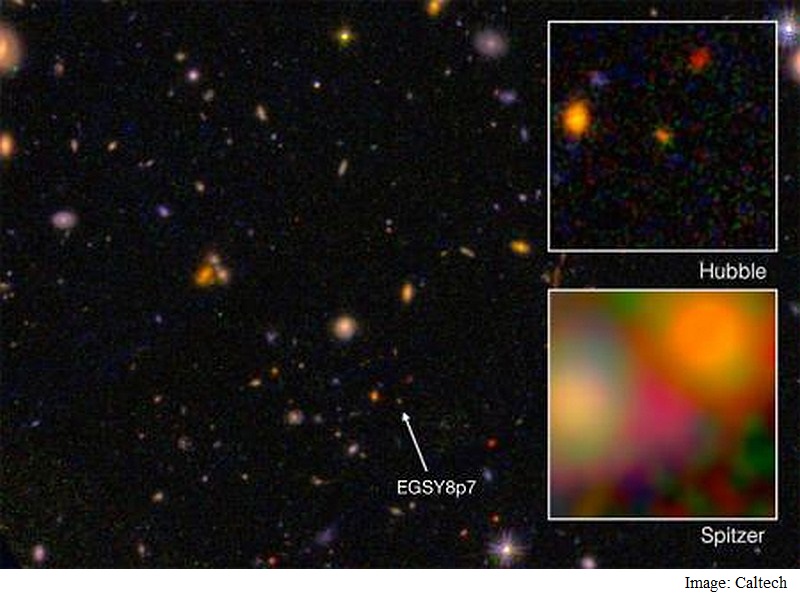- Home
- Science
- Science News
- Farthest Galaxy Detected, Astronomers Say
Farthest Galaxy Detected, Astronomers Say

A team of researchers from California Institute of Technology (Caltech) has detected a galaxy more than 13.2 billion years old which may be the most distant galaxy ever found.
The universe itself is about 13.8 billion years old.
"The galaxy we have observed is named EGS8p7, is unusually luminous and may be powered by a population of unusually hot stars," says Sirio Belli, Caltech graduate student who worked on the project.
"It may have special properties that enabled it to create a large bubble of ionised hydrogen much earlier than is possible for more typical galaxies at these times," he added.
Immediately after the Big Bang, the universe was a soup of charged particles and light (photons).
When the universe was just a half-billion to a billion years old, the first galaxies turned on and reionised the neutral gas.
The universe remains ionised today.
Prior to reionisation, however, clouds of neutral hydrogen atoms would have absorbed certain radiation emitted by young, newly forming galaxies-including the so-called Lyman-alpha line, the spectral signature of hot hydrogen gas that has been heated by ultraviolet emission from new stars, and a commonly used indicator of star formation.
Because of this absorption, it should not, in theory, have been possible to observe a Lyman-alpha line from EGS8p7.
"If you look at the galaxies in the early universe, there is a lot of neutral hydrogen that is not transparent to this emission," noted Adi Zitrin, Nasa Hubble post-doctoral scholar in astronomy.
"The surprising aspect about the present discovery is that we have detected this Lyman-alpha line in an apparently faint galaxy, corresponding to a time when the universe should be full of absorbing hydrogen clouds," noted Richard Ellis, who recently retired from the Caltech faculty.
The team is currently calculating more thoroughly the exact chances of finding this galaxy and to understand whether they need to revise the timeline of the reionisation.
"Reionisation is one of the major key questions to answer in our understanding of the evolution of the universe," Zitrin concluded in the article published in Astrophysical Journal Letters.
Get your daily dose of tech news, reviews, and insights, in under 80 characters on Gadgets 360 Turbo. Connect with fellow tech lovers on our Forum. Follow us on X, Facebook, WhatsApp, Threads and Google News for instant updates. Catch all the action on our YouTube channel.
Related Stories
- Samsung Galaxy Unpacked 2026
- iPhone 17 Pro Max
- ChatGPT
- iOS 26
- Laptop Under 50000
- Smartwatch Under 10000
- Apple Vision Pro
- Oneplus 12
- OnePlus Nord CE 3 Lite 5G
- iPhone 13
- Xiaomi 14 Pro
- Oppo Find N3
- Tecno Spark Go (2023)
- Realme V30
- Best Phones Under 25000
- Samsung Galaxy S24 Series
- Cryptocurrency
- iQoo 12
- Samsung Galaxy S24 Ultra
- Giottus
- Samsung Galaxy Z Flip 5
- Apple 'Scary Fast'
- Housefull 5
- GoPro Hero 12 Black Review
- Invincible Season 2
- JioGlass
- HD Ready TV
- Latest Mobile Phones
- Compare Phones
- Realme P4 Lite
- Vivo V70
- Vivo V70 Elite
- Google Pixel 10a
- Tecno Camon 50
- Tecno Camon 50 Pro
- Lava Bold N2
- Vivo V60 Lite 4G
- Asus Vivobook 16 (M1605NAQ)
- Asus Vivobook 15 (2026)
- Infinix Xpad 30E
- Brave Ark 2-in-1
- Amazfit T-Rex Ultra 2
- boAt Chrome Iris
- Xiaomi QLED TV X Pro 75
- Haier H5E Series
- Asus ROG Ally
- Nintendo Switch Lite
- Haier 1.6 Ton 5 Star Inverter Split AC (HSU19G-MZAID5BN-INV)
- Haier 1.6 Ton 5 Star Inverter Split AC (HSU19G-MZAIM5BN-INV)







![[Partner Content] OPPO Reno15 Series: AI Portrait Camera, Popout and First Compact Reno](https://www.gadgets360.com/static/mobile/images/spacer.png)









